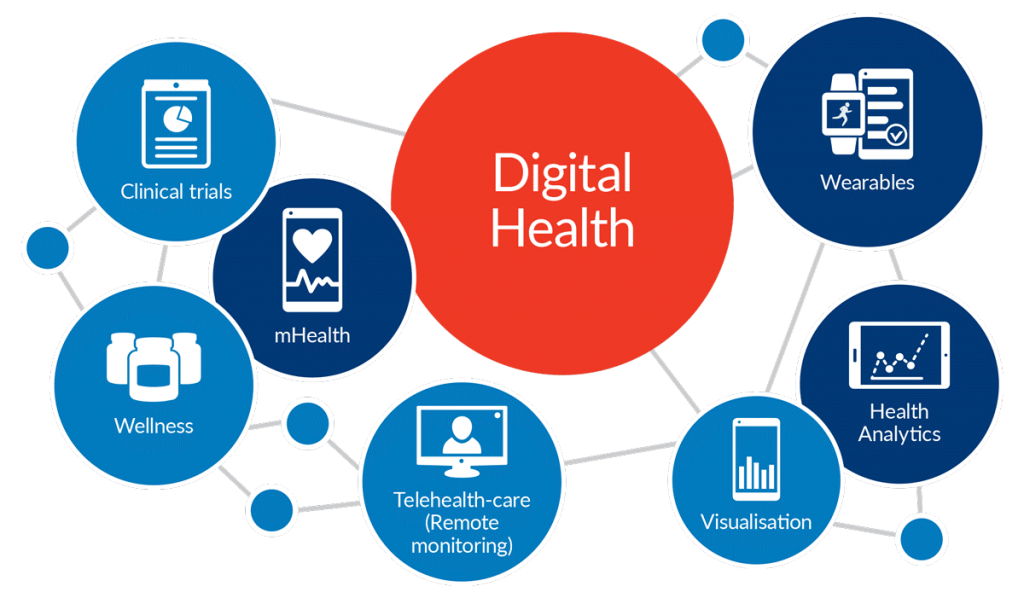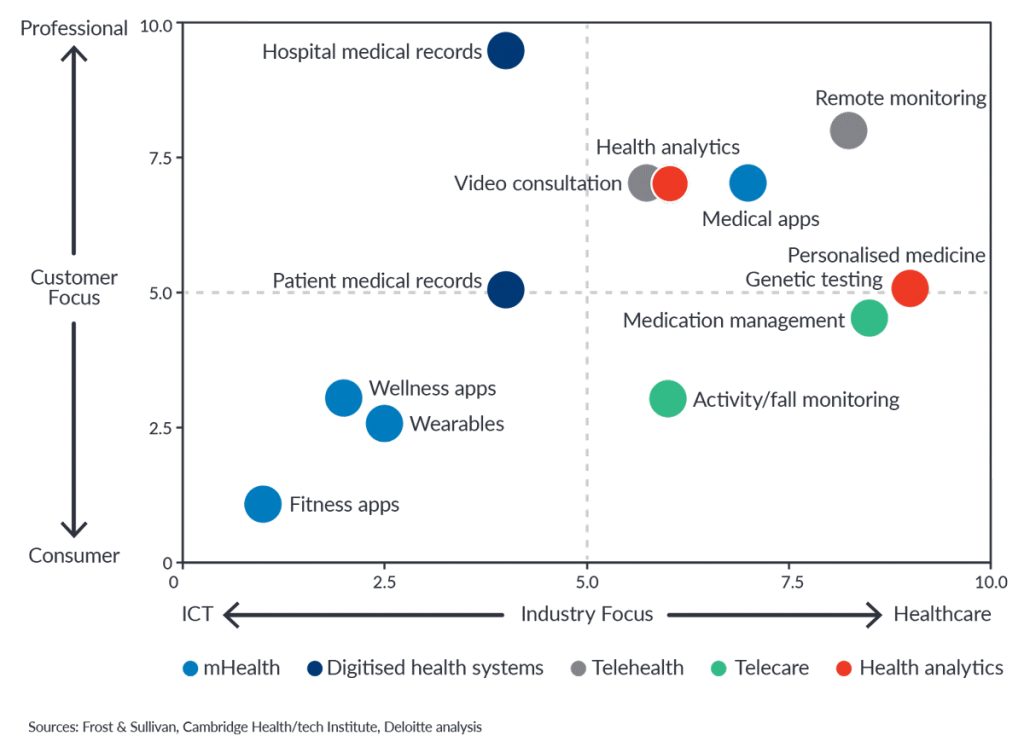The Digital Health Industry by Sarah Iqbal of Biotaware Ltd.
Category: Blog
By Janice
06/03/2017
Digital Health Industry
Healthcare and digital technology are two niches that have not traditionally been associated. However, with the evolution of the healthcare industry has come the need to be more efficient, affordable and effective. This is how the birth of digital health came about.
The digital health industry is the intersection of healthcare services and digital technology. Innovation in digital health is starting to be more widely accepted as necessary for the future of efficient healthcare service delivery. These technologies include both hardware and software solutions and services.
The digital health industry is the intersection of healthcare services and digital technology. Innovation in digital health is starting to be more widely accepted as necessary for the future of efficient healthcare service delivery. These technologies include both hardware and software solutions and services.

The connected health-Internet of “medical” things (IoT)
IoT- sensors and actuators connected by networks to computing systems—has received enormous attention over the past five years and creating real economic value in many industries, including healthcare.
The term “connected health” is the term used to described how healthcare is connecting in the digital health industry. “Connected health” involves the convergence of health, technology, digital media and mobile device. A connected health system will maximise healthcare resources and provide increased, flexible opportunities for consumers to engage with clinicians and vice versa to better self-manage their care.
Digital health is the umbrella term that comprises of technological things in health care such as the Internet of “medical” things or IoT, digital health systems, mHealth, wearables in healthcare, health analytics, telehealth, and telemedicine.
mHealth
Mobile health or better knowns as mHealth is one of the more popular terms we hear in the digital healthy industry. mHealth is a general term use for the practice of medicine and consumer healthcare care over mobile devices, with the objective to improve health comes, services and research.
The ubiquity of mobile technology offers tremendous opportunities for the healthcare industry to address one of the most pressing global challenges: making healthcare more accessible, faster, better and cheaper. mHealth is a broad industry, one that deals with consumer health through a clinical setting.

The mHealth sub-sector can primarily be divided into two categories. One group handles low- confidentiality data (personal wellness/lifestyle and activity data); this is usually a consumer-driven purchase and strong consumer interest has attracted multiple companies into the space. This group usually consist of non-regulated data. The second group manages medium to high confidentiality data (clinical health data and personal medical records); these are used by clinicians, patients or hospital system reporting. This latter group consists of regulated app; mHealth solutions in the second group offer the greatest potential to improve healthcare outcomes, but present challenges until we further improve access to data.
As a prominent observer of the digital health industry, we see both sectors converging, at some point in the future, working synonymously in exchanging data between each other. Of course, there are present challenges until the industry improves access to data. However, we believe that it is imperative to build a strong technology framework towards this vision so your investment in the digital health journey will be of value in the long run.
Challenges and efforts needed to progress forward
Digital health is a fast-growing industry and it has great potential to improve access to healthcare. Wide scale deployment/adoption also has the potential to improve efficiency, productivity and cost-effectiveness of healthcare delivery. However, despite the fast-growing pace, healthcare technology is still catching with other industries. Many systems are still paper-based, report data is frequently months old and collaboration among disciplines or institutions is still uncommon. Nonetheless, there are many of digital health projects that have been conducted globally with the aim to grow mobile technology for improving clinical studies and consumer well-being. Below are challenges facing the digital health industry:
| Challenges | Descriptions |
| Regulatory uncertainty | There is still significant regulatory uncertainty around technologies in digital health. Nonetheless, regulatory bodies in the US and EU are increasing scrutiny over mHealth. |
| Unclear approved reimbursement mechanism | Unclear reimbursement mechanisms reduce the incentive for application developers and wearable makers to focus on the healthcare system as a customer. The willingness of patients adopt mHealth is not reflected in the ability of doctors to prescribe smartphone apps and wearables. |
| Data connectivity and interoperability | The adoption of interoperability standards has been inconsistent due to the entrenched business interests of vendors offering closed end-to-end solutions. Currently, there is a mixed approach in the adoption of standards and application programming interfaces (APIs). Being able to meet standards and pull together the interoperability jigsaw is a long-term and challenging task. It is also hugely important. |
| Data privacy and security | Privacy and security remain an ongoing concern for researchers conducting mHealth studies. Not only is the sensitivity of the data an issue, but also the amount that can be collected using mobile devices. |
| UX/UI mHeath software | To get the most out of the technology of today and of the future, user experience & interface design is going to play a key role and needs to be designed around the patient and the clinician participating in the study. |
| Patient compliance/data integrity | It can be a challenge to get the patient to comply to, for example, adopt good practices in capturing data while participating in a study. Innovative ways to encourage positive behavior change through mHealth apps and gamification need to be explored to encourage patients to comply with clinical processes. |
There is an unprecedented opportunity to transform the healthcare sector and empower citizens in taking charge of their own health. The capabilities constitute a new paradigm for evidence generation in health research, promising, perhaps more than any previous wave of innovations in health technologies. As we progress in 2017, we need to accelerate efforts to address these challenges to grow the mHealth industry quicker.
Written by Sarah Iqbal of Biotaware
To be featured or find out more:
e-mail us on support@companyconnecting.com
call us on 0845 643 5375
"The Digital Health Industry by Sarah Iqbal of Biotaware Ltd. " First published on Company Connecting February 2017
©Company Connecting





